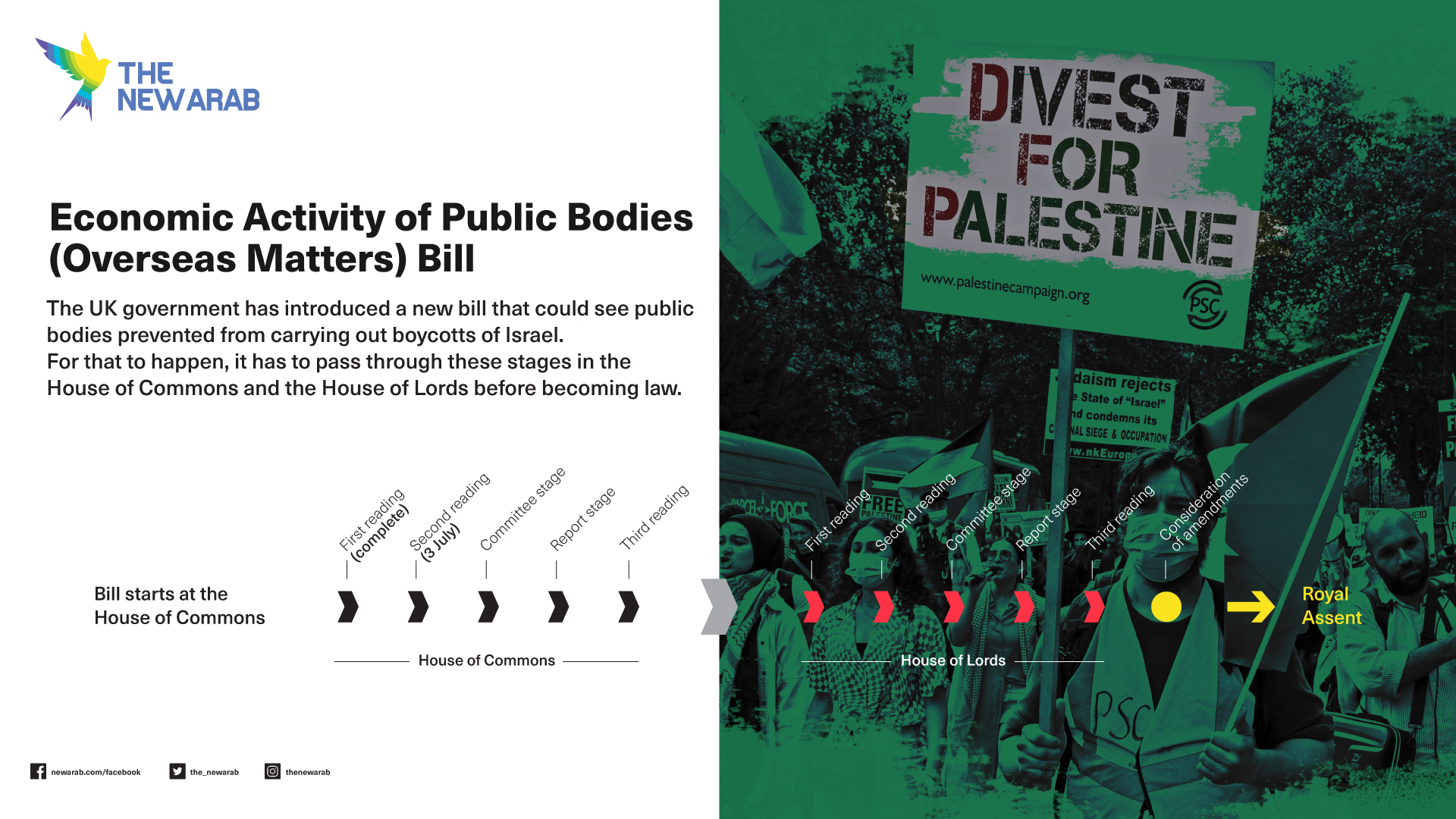BDS: Pro-Palestine groups to challenge UK anti-boycott bill, call it a dangerous threat to freedom of speech
Pro-Palestine groups have confirmed to The New Arab plans to oppose the UK government's 'anti-BDS' bill, which was introduced to parliament on Monday, posing a chilling threat to protests of Israeli occupation and abuses against Palestinians.
The bill, titled the 'Economic Activity of Public Bodies (Overseas Matters) Bill', aims to "prevent public bodies from being influenced by political or moral disapproval of foreign states when taking certain economic decisions".
The proposed law could threaten pro-Palestinian Boycott, Divestment and Sanctions (BDS) actions in the UK, the leading umbrella pressure group challenging Israel's illegal occupation of the Palestinian Territory via non-violent methods.
Speaking to The New Arab, Palestine Solidarity Campaign (PSC) confirmed it was working with other campaign groups to "try and bring pressure to bear on the government to scrap the bill and on opposition parties to vote against it" before the anti-BDS proposal becomes law.
Opposition to the bill
Other groups have also confirmed to The New Arab a plan of action to tackle the anti-BDS bill, which passed the first stage to becoming law on Monday and will hear its second reading in the House of Commons on 3 July.
The activists, along with Human Rights Watch, Diaspora Alliance and other NGOs, will address MPs on Wednesday warning about the alarming potential consequences of the proposed law.
There are fears that it would ban any form of campaigning in the UK against Israeli abuses of Palestinians and settlement expansion in the occupied West Bank, which international law and even the British government consider illegal.
The PSC say they will mobilise local branches to "maximise the pressure on MPs", hold protests outside parliament, and look into possible legal challenges if the bill becomes law".
"British law [would be] effectively calling for Israel and the territories it occupies illegally to be treated in the same way... offer statutory defence to the settlements despite the fact that the British government formally recognises them as being illegal," the PSC said.
The European Legal Support Centre (ELSC) also confirmed they are "determined to combat the passing of this bill in Parliament, whether by legal or advocacy means, and we are not alone".
"We'll do so within a coalition of more than 70 organisations in the UK who have come together to oppose this bill," they told The New Arab.
The coalition, which will include the PSC, will come under the banner of the "Right to Boycott", demanding the government "immediately halt this bill" and calling on opposition parties "to oppose it".
'Threat to Free Speech'
There are huge concerns that the bill goes beyond Palestine and will restrict the rights of activists to protest other foreign policy issues
Liberal Democrats’ Spokesperson for Foreign Affairs MP Layla Moran has warned that the proposed law poses a grave threat to free speech in the UK.
"[It] will greatly restrict the freedom of speech of anyone who wants to raise the alarm of human rights abuses across the world," the Palestinian-British MP told The New Arab.
"The Liberal Democrats are therefore calling for the introduction of legislation which would cease trade with illegal settlements entirely. The only way to promote freedom of speech and stand up for human rights is to vote against the Conservatives at every possible opportunity."
Chris Doyle, director of the Council for Arab-British Understanding (CAABU), said the bill is "excellent [news] if you are a regime anywhere in the world with an appalling human rights record".
Many have pointed out that the bill not only threatens pro-Palestine campaigning against the Israeli occupation of the West Bank and siege on Gaza but also forced Uyghur labour in China's Xinjiang province and even environmental issues.
Staggering new anti-boycott Bill proposed by Gove - effectively banning public bodies from boycotting those who abuse human rights or the planet. Yet another utterly anti-democratic clampdown we've come to expect from this Govt. This Bill should be nowhere near our statute book. pic.twitter.com/KgWkfGsArk
— Caroline Lucas (@CarolineLucas) June 20, 2023
The UK government claims the bill will not change its position on its recognition that Israeli settlements in the West Bank are illegal, but campaigners say if made law it would effectively ban advocacy on the issue with BDS considered one of the most effective forms of protest.
Non-violent protest
Pro-Palestine activists across the world have called for the boycott of goods and services in Israeli settlements in the Palestinian Territory, which include successful campaigns against the sale of Ben & Jerry's ice cream and Airbnb listings at these illegal outposts.
Chris Doyle told The New Arab that despite the government's verbal opposition to settlements, the bill highlights that it "does not support disinvestment from settlements".
Doyle said the law would "undoubtedly" embolden Israel's settlement expansion, considered illegal under international law, which continued last week with the hard-right Israeli government's approval of thousands of new settlement units.
"I think that the problem with the UK government policy is that it's in name only... [it is] weakening any attempt to hold Israel accountable in some form for illegal actions," Doyle added.
The Palestinian Ambassador to the UK, Husam Zomlot, echoed these fears, as another wave of pogroms against Palestinian villages by Israeli settlers hit the West Bank this week.
"This bill encourages more violations of international law, including the acquisition of territory by force, the moving of civilian settler populations to occupied territory - a war crime - or land confiscations and home demolitions," the ambassador said in a statement.
The New Arab has contacted the architect of the bill Secretary of State for Levelling Up, Housing and Communities Michael Gove for a response to criticism of the bill but received no response.
Western countries allied to Israel have been passing similar anti-boycott laws in recent years, in some cases as a result of active lobbying by pro-Israel groups.
In February, the US Supreme Court declined to review an Arkansas state law forcing contractors to pledge not to boycott Israel, leaving the anti-BDS state law to stay in place in a setback for freedom of speech campaigners led by the American Civil Liberties Union (ACLU).






 Follow the Middle East's top stories in English at The New Arab on Google News
Follow the Middle East's top stories in English at The New Arab on Google News


